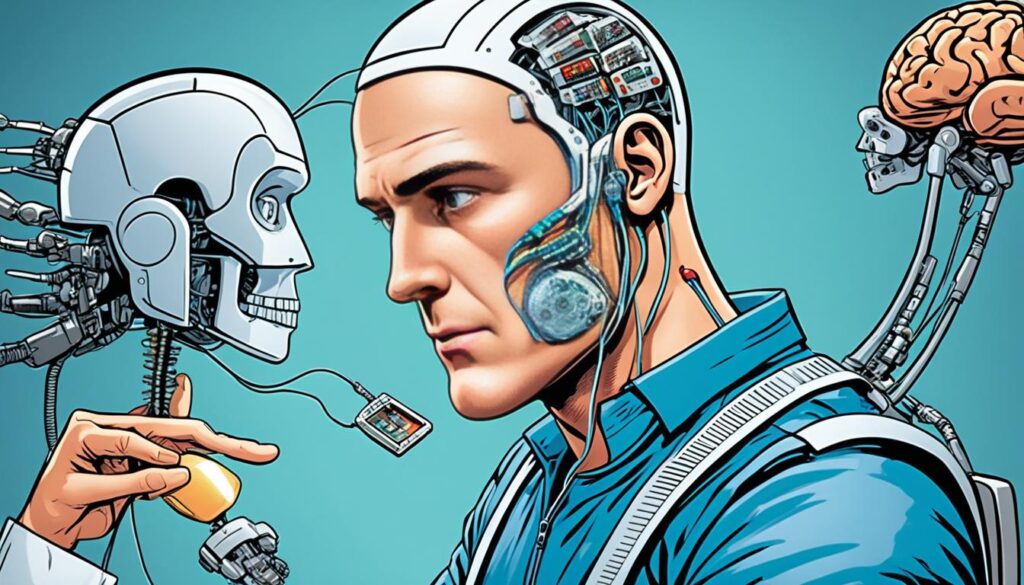In today’s fast-paced world, technological advancements are making brain implants and neural implants more real. The rise of cyborg technology raises a big question: will we see chips in our heads? Talk of mind-reading devices or mind control technology might seem way off. But, new findings in the areas of neuroethics and AI-brain interfaces suggest it’s not that far away.
Elon Musk recently made a big announcement about his company Neuralink. They’ve successfully put a brain-computer interface into a person for the first time. This is a huge leap in cybernetics and biohacking, pushing us closer to merging with machines. The discovery makes us consider the good and bad sides of pairing our minds with tech.
The Current State of Brain-Computer Interfaces
In an exciting reveal, Elon Musk shared news about Neuralink. His company had successfully put a brain-computer interface in a person. This achievement signals a big leap in neural tech. It also makes us wonder: will there ever be a chip implanted in my head? Though this idea sounds like it’s from a movie, the fast progress reveals it could be true soon.
Neuralink’s First Human Implant
Neuralink launched The PRIME Study to help people with quadriplegia. They are aiming to let them use external devices just by thinking. With the help of neural activity, this chip might give some back their freedom. This step forward is huge for BCI technology and its future uses.
Other Companies Developing BCIs
Neuralink is getting a lot of praise, but others are working hard too. Many companies and research groups are moving on BCIs for different needs. These include helping people with locked-in syndrome talk again and boosting brain power in healthy folks. As the area grows, we expect more to join, all bringing new ideas and tech.
How Brain Implants Work
Brain implants, like the ones from Neuralink, pick up on and understand brain activity. They use a tiny probe inserted into the brain. This probe lets us communicate with the nerve cells, which are key for our thoughts and actions.
Recording Neural Activity
A probe in the brain catches the electrical signals released by nerve cells. We call these signals action potentials. They are the basic form of brain communication. Brain implants can then monitor what the brain is doing at that moment. Yet, it’s hard to keep up with the huge amount of data the brain creates.
Stimulating Brain Regions
Brain implants don’t just look at brain activity. They also send tiny electric shocks to certain brain areas. This can help change how the brain works and possibly treat brain diseases. The stimulation part is different from just watching the brain, and it needs to be very carefully done.
Wireless Communication with External Devices
These implants use Bluetooth to send brain data wirelessly. Bluetooth makes data sharing easier and more compact. Even with mixing various signals, enough data can be shared. As wireless tech gets better, so will brain implants, making them work smoothly with other devices.
Potential Applications of Brain Implants
BCI technology is moving forward fast. This innovation can help with a lot of things. It can give back movement and speech to those with paralysis, ease neurological issues, and maybe make us think better.
Restoring Mobility and Communication for Paralyzed Individuals
Brain implants offer hope to those with paralysis. They can help folks move again and talk better. This works by reading brain signals for movement. Already, some patients move robotic arms just by thinking. Imagine improving your life this way.
Treating Neurological Disorders
BCIs might also fix brain health problems. Neuralink, a company by Elon Musk, aims to balance mood and hormones. This could help with issues like OCD or depression. Though not as deep as some treatments, BCIs of the future may help more with brain conditions.
Enhancing Cognitive Abilities
Researchers don’t stop at just health uses. They want to boost how our brains work and help with conditions. They’re looking into affecting brain areas linked to eating. This might aid those fighting obesity. While this idea is new, progress suggests surprising uses ahead.
BCI tech keeps offering more hope. It could bring back what’s lost, fix brain issues, or even boost our thinking. The future of brain implants looks very promising for all kinds of people.
Challenges and Limitations of Brain Implant Technology
Brain implant technology is set to change the lives of those with severe disabilities. But we must also face the limits and hurdles. There are surgical risks, stability issues, and deep ethical questions. The path to using brain implants widely is not easy. It is marked with many complex challenges.
Surgical Risks and Complications
Getting a brain implant involves a complex and risky surgery. Patients might have issues like bleeding or infections, leading to severe problems. The brain stimulation could even cause epileptic attacks. This stresses the importance of managing these hazards very carefully.
Long-term Stability and Biocompatibility
Making sure brain implants last long and work well is a big issue. The body might reject the implant over time. This rejection can cause problems. Engineers are working hard to create devices that the body won’t reject.
Ethical Concerns and Regulation
The ethical and regulatory concerns around brain implants are critical. The risks are largely unknown. This makes open discussions, strict rules, and clear guidelines crucial. We must be careful in developing and using these implants. Safety and ethics should be top priorities.
Debunking Myths and Misconceptions about Brain Implants
In our fast-moving tech world, we often hear myths about brain implants. One big myth is that you can get microchipped without knowing it. People worry these chips make them feel pain or control their thoughts. But, this idea is not true. It mostly comes from movies and stories.
Fiction shows have also made these myths stronger. Stories in movies and on TV can make brain implants sound scary. They might make you think these implants can be used to attack or control people’s minds. But, this is not what experts say.
Also, online groups can make these false ideas seem real. When people with the same fear talk online, they might think these myths are true. It’s important to check the facts from a trusted source.
Beware of scammers who claim to find or remove these fake chips. They trick people who are really scared. Remember, real science doesn’t back up these claims. So, don’t fall for these tricks.
Chips that exist in real life, like those for pets or keys, are very different. They can’t be used to attack or control someone. They are limited in how they work and what they can do. Science proves these myths wrong.
We must be smart about new technologies. By learning and using good sources, we can fight false information. Let’s make sure we know the truth about brain implants.
The Future of Brain-Computer Interfaces
Brain-computer interface technology is advancing fast. It brings exciting chances for medicine and human improvement. The technology is young but brimming with potential. It aims to change how we work with devices and understand our minds. This new tech focuses on getting smaller, going wireless, and using AI better.
Advancements in Miniaturization and Wireless Technology
The dream is to make BCIs that are small and easy to put in your brain. Thanks to Technological advancements in miniaturized devices, like low-power amplifiers and increased bandwidth, BCIs will work better. These steps forward mean putting them in won’t be as big a deal. And, they’ll work more reliably.

Integration with Artificial Intelligence
BCIs merging with integration with artificial intelligence (AI) is also crucial. This mix hopes to make clever, custom systems. They’ll understand what users want and need. This could make BCIs interact naturally with our brains and devices.
Potential for Mainstream Adoption
The future possibilities of BCI tech are huge but, getting there will take time. Today, BCIs focus on helping the severely impaired. Their goal is to give back some independence and better life quality. Using BCIs for tasks like enhancing thought or reading minds is still a dream. It’s not something we’ll see soon.
Ethical Considerations and Societal Implications
Brain implant technology is moving forward quickly. It’s important to think about the ethics and how it might affect society. These new devices make us ask big questions about our privacy, keeping our information safe, and who we are as people.
Privacy and Security Concerns
Keeping our brain data safe is a big worry. Brain implants can record and send our thoughts. To keep this data private, we need strong online security. This can stop others from seeing things we want to keep to ourselves.
Equality of Access to Brain Implant Technology
It’s also crucial that everyone has the same chance to use this technology. Without equal opportunities, some could miss out on its benefits. We need to make sure that anyone who might benefit can actually get these brain implants. This should be true for rich and poor alike.
Impact on Human Identity and Autonomy
Integrating brain implants can change who we are and how we make choices. As these devices get better, they might affect how we think and act. We need to find a good balance. This balance should let us enjoy the help they offer without losing our personal freedom.
Working on these problems needs everyone’s help. Doctors, leaders, and the public need to talk together. We must set up rules to make sure these new technologies are good for everyone.
Will there ever be a chip implanted in my head?
Advances in technological feasibility make chip implants in our heads closer to reality. Specialists forecast that brain-computer interfaces might be common in a few decades. Yet, if this will happen for most people is still unsure.
This technology aims to help people with severe conditions, not everyone. Choosing to get a brain implant would be a personal choice connected to medical necessity. It’s not expected to be a standard for everyone.

Looking at brain implants, we must separate current tech from the wild ideas in science fiction vs. reality. While the thought of a chip in our brains sounds like a story from the future, it’s more involved than that.
Development in brain-computer interface tech is ongoing. We need to look at this development realistically. This means recognizing how it might truly help those who need it. Not just what we see in movies.
Conclusion
With the rapid progress of brain implant technology, we face important choices. We need to look at the ethical considerations and societal impact closely. Brain implants offer hope for those with severe disabilities. They can bring back mobility, help communication, and improve life quality. But, the idea of human enhancement and widespread use brings up tough questions for society.
Responsible development is crucial for brain-computer interfaces. They should go through strict tests and have strong data security. Plus, we need equal access and ongoing ethical checks to make sure they’re safe and fair. Currently, these technologies are not for everybody and we have to focus on their real medical benefits.
Thinking about chip implants becoming normal may sound like a movie plot. But, the quick advancements in this area show it might be closer than we realize. If we handle the challenges wisely and guide this technology’s path, we can ensure it brings good changes. The choices we make now are key. They will shape the kind of future we want to see with brain implants.
